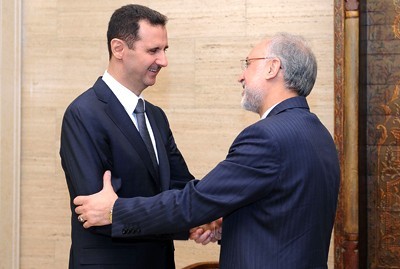
As he stresses that Syria is open to all initiatives aimed at solving the ongoing crisis in the country, President Bashar al-Assad tells the visiting Iranian Foreign Minister Ali Akbar Salehi that the current battle targets the resistance as whole, not only Syria.
During the meeting with Salehi, who arrived on Wednesday in Damascus, President Assad “underlined the importance that all initiatives be built on correct bases that respect the Syrian sovereignty, the Syrian people’s free decision and rejecting foreign interference,” State news agency, SANA, reported.
The agency added that the talks were held “in a highly positive and important atmosphere,” and “discussed bolstering mutual cooperation in all fields as to enable the people of the two countries to smooth over the difficulties posed by the unjust unilateral sanctions that are aimed to break their will and subjugate them to serve Western and Israeli interests.”
President Assad also congratulated the Iranian side on the remarkable diplomatic and political performance at the Non-Aligned Movement Summit.
For his part, Salehi expressed the Islamic Republic’s “boundless” support to the Syrian government’s efforts to restore security and stability in the wake of the reforms made by President Assad.
The Iranian FM also briefed the Syrian leader on the outcome of his latest visit to Cairo, in which the contact group on Syria convened there by the foreign ministers of Turkey, Iran and Egypt, with the absence of the Saudi FM.
The meeting in Damascus was attended by Deputy Prime Minister and Minister of Foreign Affairs and Expatriates, Walid al-Moallem, Presidential Political and Media Advisor, Bouthaina Shaaban, Assistant Foreign Minister, Ahmad Arnous and Director of the Media Department at the Foreign and Expatriates Ministry, Jihad Maqdissi.







